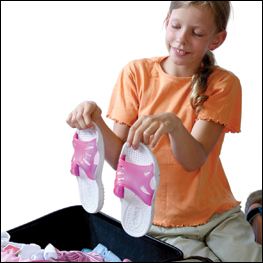
“Mom, you forgot to pack extra socks,” says my 10-year-old son accusingly. We have just picked him up after a week at camp. Socks, I muse, mentally searching through the gear I had packed over a week ago. I remembered making an extra trip to the store for the hiking socks requested on the camp list. Had I not packed them? “Do you mean the hiking socks?” I inquire.
“No, just any socks. I have a blister because I wore the same pair of socks all week,” he says, his voice rising.
“I packed more than enough socks,” I assure him. “They were right there with your underwear.”
“Oh, yeah, I could not find my underwear, so I wore the same pair of underwear all week too.” His dad and I burst out laughing, but he does not see the humor.
“They were not in the bag. I even had a counselor help me look for them,” he asserts confidently.
Puzzled, I wonder if he could have been the butt (pun intended) of a cabin prank and someone had hidden his underwear and socks.
When we arrive home, I open the large gear bag. Lo and behold, jammed in one section, just where I packed them, are ample clean socks and underwear. I show him.
“Oh, I guess we never saw the second zippered section,” he says.
My mind harkens back to the night before camp when I finished packing his bag and then, as suggested by the camp guide, I walked him through where everything was. I suppose the, “Yeah, yeah, mom, I know,” should have sounded an alarm that he was not fully engaged. Lesson learned. The following year, he packed his own bag and I reviewed it.
As you pack and prepare to send your child off to camp – whether it is the first or the fifth time – remember that camp organizers are experts, so trust their directions and follow them closely.
Here are some general guidelines that I have learned and relearned after sending two children to various camps for more than six years:
Have children pack their own bags with supervision so that they can find those important socks and underwear. Plus, it adds to their sense of independence - another reason we chose to send them to camp.
If it leaves your house, label it. From luggage to individual items, use a system to label every T-shirt, shoe or flashlight. Pre-printed labels are great, but expensive. One year when my daughter attended camp, we created a logo for her using her initials and marked all items using a permanent marker. Even if another camper had the same initials, her items were uniquely identified.
Be considerate with care packages. Double check if this is even allowed. In more rustic surroundings, food is not allowed in sleeping quarters because it attracts wild animals. If food is permitted, please send enough to share with cabin mates but be sensitive to any allergy issues. Many camps are peanut- or nut-free facilities.
Pack it in and pack it out. A horse camp my daughter attended suggested that campers bring a detailed list of their belongings. When she was packing up to come home, it made it easier for her to locate missing items when she knew she was looking for two pink shirts. She liked this technique so much she has used it to pack for other camps.
Overcome your ‘helicopter’ tendencies. Keep communication to a minimum and obey any camp restrictions. Many camps allow one-way communication where parents can send a daily letter or email to the child. You are the expert on your children, will receiving a daily note from you make them more or less lonely? Our son asked us not to send any notes the second year as he found the notes made him lonely.
Be strong. I know you may be anxious and missing your child, but do not call the camp unless it is an emergency. Pack your own anxiety away, and prepare your child for the possibility of homesickness. Tell them that this is normal and can happen to campers of any age. Assure them that you know they can handle it. Counselors should be trained to help campers work through these issues. If your child calls crying for you to come and get them, steel yourself and repeat that you are confident in their ability to manage this. Then speak to the head counselor to assess the situation. This happened to us the first year our son attended camp, but he worked through it (so did mom and dad) and he felt very proud and independent when he completed his first week at camp.
Valuables like jewelry and expensive electronics belong at home. If children attend camp with cell phones or iPods, they are missing the opportunity to connect and make new friends. Isn’t that why we are sending them to camp in the first place?
Start reviewing the suggested packing list with your child a few weeks before camp. This gives you ample opportunity to purchase any missing items, and it allows your child to start thinking and getting excited about camp.
Sue is a health and wellness journalist with years of both family camp and residential camp experience. To date, she has always sent ample socks and underwear to camp.
Calgary’s Child Magazine © 2024 Calgary’s Child